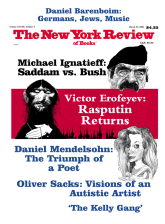To the Editors:
In her fascinating article “God’s Country” [NYR, November 2, 2000], Joan Didion suggests but does not deal with the question “Should we be concerned over which God?” We can be sure that for most Americans it is not the deist God of many of the Founders, the God that avoids the greatest number of rational objections. But most current sects do have a God somewhat different from those of the other sects. Madison suggested the reason: “When the Almighty himself condescends to address mankind in its own language, his meaning, luminous as it must be, is rendered dim and doubtful by the cloudy medium through which it is communicated.” Dim and doubtful revelations can be contradictory, hence cannot all be true, and there is no way to settle the matter rationally. So there may be a problem in God’s Country.
The drafters of the Constitution sought to mitigate that problem with Article VI (“…no religious test shall ever be required as a qualification to any office or public trust under the United States”); by not even mentioning God in it; and by the First Amendment.
Will those precautions help us maintain our marvelous tolerance? Gibbon noted that “the various modes of worship which prevailed in the Roman world were all considered by the people as equally true; by the philosophers as equally false, and by the magistrates [read “politicians” now, Gore, Bush, Lieberman, Cheney, et al.] as equally useful. And thus toleration produced not only mutual indulgence, but even religious concord.” What we see in some other countries is disquieting, but here, aside from our fundamentalists, religious intolerance is very minor compared to what caused Montaigne in the sixteenth century to say, “It is putting a pretty high figure on your conjectures to burn a man alive because of them.”
The legality of public prayers under governmental auspices is one issue that does exacerbate tensions between sects. Court rulings against such prayers in order to preserve the constitutional separation of Church and State are under attack by those who forget or ignore the potential danger. Ms. Didion quotes columnist William Raspberry being condescending about it: “I need my civil liberties friends to tell me again the mortal danger of prayers—of religion generally—in public places. I keep forgetting it.” He seems to feel it is too trivial to bother remembering the reasons for it. Not a good sign.
Oddly, praying in public is one of the things on which most sects are in agreement, even though it is proscribed by Jesus in Matthew 6:5–8. Not only do Herb Lusk, “the praying tailback” whom Ms. Didion mentions, the chaplain of the House, and most other Christians ignore this proscription and pray publicly. They also routinely tell God what He obviously already knows, as Jesus points out. Matthew 6:5–8 seems perfectly clear, but no doubt there are contrary directions somewhere in the Bible, another notorious difficulty with relying on revelations to determine which God our country is supposed to belong to.
William G. Keehn
Mountain View, California
Joan Didion replies:
The biblical passages to which Mr. Keehn refers read, in the Revised Standard Version, as follows:
[Matthew 6:5] “And when you pray, you must not be like the hypocrites; for they love to stand and pray in the synagogues and at the street corners, that they may be seen by men. Truly, I say to you, they have received their reward.”
[Matthew 6:6] “But when you pray, go into your room and shut the door and pray to your Father who is in secret, and your Father who sees in secret will reward you.”
[Matthew 6:7] “And in praying do not heap up empty phrases as the Gentiles do, for they think that they will be heard by their many words.”
[Matthew 6:8] “Do not be like them, for your Father knows what you need before you ask him.”
This does seem pretty clear-cut, but I am confident there is a way of interpreting it as both the inerrant Word of God and an argument for prayer before high school football games.
This Issue
March 29, 2001



